According to Minister Nguyen Van Thang, the Ministry of Transport will tighten inspection, control, and define the responsibilities of the Ministry and Department in training, testing, and granting driving licenses.
During the first 60 minutes of the morning session on June 8, Minister of Transport Nguyen Van Thang continued to answer questions from delegates from the end of the previous session. He also continued to receive many questions about hot issues such as testing, issuing driving licenses, violations in vehicle registration, slow progress of transportation projects, and lack of materials for highway construction.
Delegate Trang A Duong said that good management and improving the quality of training, testing, and issuing driving licenses are important factors that help drivers participate in traffic safely, thereby reducing the number of accidents. However, in recent times, in some localities, there have been cases of harassment, annoyance, and negativity in training, testing, issuing, and exchanging driving licenses, causing public outrage. The delegate asked the Minister to provide solutions to overcome this situation?
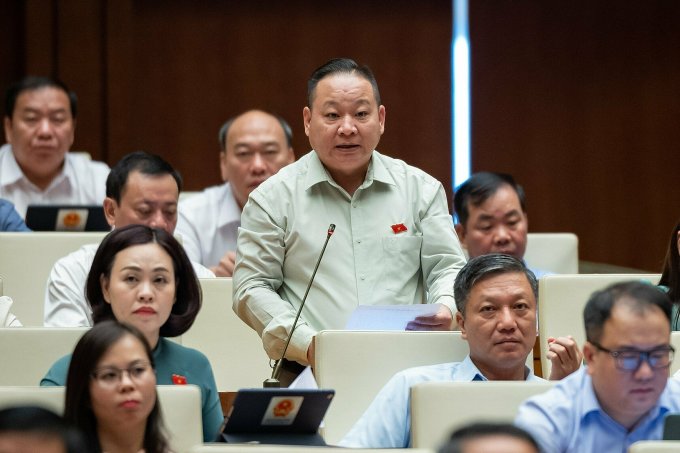
Delegate Trang A Duong. Photo: National Assembly Media
Minister Nguyen Van Thang said that he has identified this problem. In the coming time, the Ministry will tighten inspection, examination, and define the responsibilities of the Ministry of Transport and the Department of Transport of the provinces in training and testing for driver's licenses. "Currently, the testing and granting of driver's licenses is decentralized to the locality, the Ministry only performs the task of state management. We will closely coordinate with the provinces and cities to thoroughly overcome the problem raised by the delegates," said Mr. Thang.
Minister Nguyen Van Thang answers questions. Video : National Assembly Television
Ministry takes responsibility for vehicle inspection violations
On the afternoon of June 7, participating in the debate on the issue of vehicle inspection with Minister Nguyen Van Thang, delegate Tran Thi Kim Nhung (Standing member of the Law Committee) said that the shortage of staff causing the vehicle inspection crisis was partly the responsibility of the Ministry of Transport. The Ministry was not proactive and did not coordinate with other agencies in a timely manner to resolve this issue. The female delegate asked the Government to clarify responsibilities and Deputy Prime Minister Le Minh Khai to clearly state the lessons learned from the incident.
Responding to delegate Nhung, Minister Nguyen Van Thang affirmed that the incident at the Vietnam Registry and the registration centers was an "extremely painful" incident for the registration sector and the transport sector. "The Ministry is responsible with the Vietnam Registry for the violations that occurred in registration activities in the past time," said Mr. Thang.
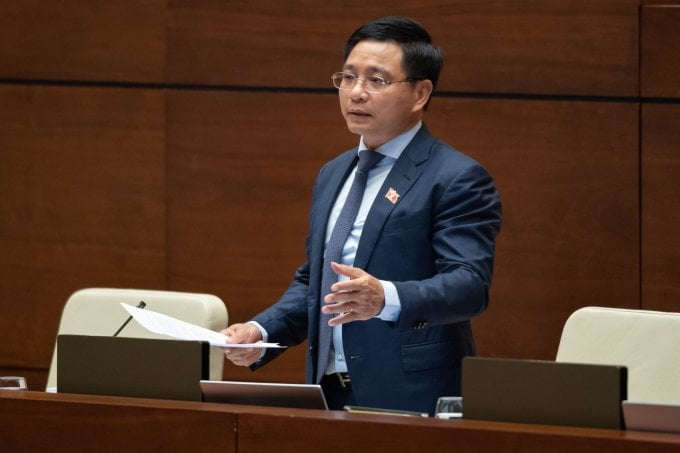
Minister of Transport Nguyen Van Thang. Photo: National Assembly Media
However, he explained that when the police force conducts investigations, prosecutes, and detains inspectors, the Ministry of Transport cannot request the Ministry of Public Security to notify in advance. For example, when the police search inspection centers, the Ministry of Transport has a document requesting the Ministry of Public Security to create conditions for seizing machinery, equipment, and sealed documents to serve the investigation, to do so early and quickly, and then hand over the inspection center to the Department of Registration to take over and deploy forces.
However, 75% of the inspection centers are private, so it is not possible to restore them immediately, especially among those who have been prosecuted and detained, there are key personnel who are senior inspectors. These are people who are very difficult to replace because usually each center only has one. It takes 1-1.5 years to train a senior inspector. According to the Minister, the basic inspection problem has been resolved, and the conditions for the inspection centers to operate are basically guaranteed.
Delegate Nguyen Thanh Nam (Deputy Head of Phu Tho Delegation) agreed that the Ministry has many solutions to stabilize inspection centers in a short time. However, Mr. Nam suggested defining the responsibility of the Minister of Transport and localities in timely inspection and supervision to prevent exploitation when the demand for inspection increases.
Delegate Leo Thi Lich (Standing Member of the Ethnic Council) debated and agreed with the Minister's statement that only training leaders and human resources would solve the problem of inspection centers. However, she said that "The Minister has only solved the tip of the problem, but the root cause has not been clarified by the Minister."
Regarding the responsibility of state management of specialized agencies for allowing a series of violations to occur at inspection centers, "is it true that when socializing inspection activities, there is a lack of inspection and supervision, allowing inspection to be socialized to the point of losing control, allowing the centers to act arbitrarily?"
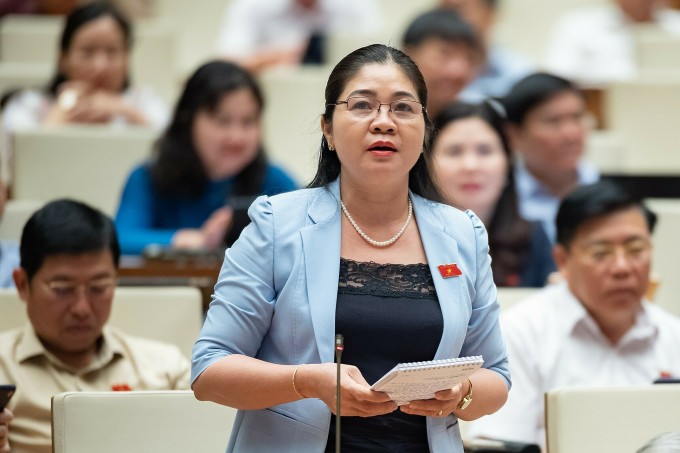
Delegate Leo Thi Lich (Standing member of the Nationalities Council). Photo: National Assembly Media
Ms. Lich cited examples such as thousands of cars that have expired their license plates and are banned from circulation, but these cars are still issued inspection certificates and openly circulate, causing many dangers to people. A typical example is the case of an expired car transporting students, causing a heartbreaking accident. "As a state manager, what does the Minister think about this issue?", Ms. Lich questioned and asked Deputy Prime Minister Le Minh Khai to clarify further.
Minister Nguyen Van Thang said the reason for the violations of the inspection centers was due to not responding promptly to policy changes. Decree 139 had a planning for the inspection network, but when the Planning Law was issued, the sectoral planning was no longer effective, so inspection centers in localities flourished.
In just 2 years, the number of inspection centers has increased to 281, surpassing the entire inspection network by 2030. Because of the proliferation of inspection centers, there is unhealthy competition and then negativity. "This story has embezzlement, collusion, responsibility and ethical issues of departments from department leaders to leaders of the Vietnam Register," Mr. Thang acknowledged.
According to the Minister, this has disabled the inspection and supervision work because "when they collude, they cannot shoot themselves in the foot". Recognizing this problem, the revised Decree 139 has included the element of controlling the opening of local inspection centers; decentralizing the licensing of inspection services to local Departments of Transport and tightening regulations on controlling inspection work.
Delegate Ly Van Huan (Deputy Chief of the Thai Nguyen Provincial People's Procuracy) questioned that violations in vehicle registration and driver's license testing have been ongoing. However, through inspections in 63 provinces and cities, the authorities did not detect any violations and only transferred 6 cases related to driver's license testing violations to the police. "So is the quality of inspection due to the capacity of the officials or is it due to respect, avoidance or other pressure that they were not detected?", Mr. Huan asked.
Minister Nguyen Van Thang admitted that one of the reasons for violations in vehicle inspection is poor inspection work. However, vehicle inspection activities are relatively closed, so inspectors only check on documents, while violations are not in the documents, "the documents are very good but there are still violations".
In addition, the vehicle inspection department has an information technology system to check factors related to vehicles, but this software is not secure, so it is easy to be exploited, interfered with, and change data. Inspectors with normal operations cannot detect it. Other negative factors such as receiving money and corruption are also outside the records, making it difficult for inspectors. "But it cannot be denied that the inspection activities in the past have not fulfilled their responsibilities and have not met requirements," Mr. Thang admitted.
He said that when he first took office as Minister of Transport, he requested that two tasks be done immediately: inspecting the vehicle registration system and inspecting driver training and licensing. When the inspection team returned and reported, they could only conclude that "there were signs of violations in interfering with the driver time and distance monitoring system." But Mr. Thang disagreed and said that this was not fulfilling his responsibilities. After that, he requested that forces be focused on doing a good job of inspection.
Highway progress behind schedule due to lack of capital
Delegate Nguyen Thi Hong Hanh (Deputy Director of the Ho Chi Minh City Department of Justice) said the Ben Luc - Long Thanh expressway project was approved for investment in 2010 and is expected to be completed in 2022. She asked the Minister to provide information on the progress and commitment to the completion time of this project.
Minister Nguyen Van Thang said the main reason for the delay in the project was that the Vietnam Expressway Corporation (VEC) had difficulty in obtaining counterpart funds. Meanwhile, JICA and ADB funds could not be disbursed. This led to the agreement not being extended when it expired. To resolve the issue, the Ministry of Transport coordinated with the Capital Management Committee and VEC to submit to the Government and the National Assembly a proposal to resolve the financial issue.
The problems have now been resolved. JICA capital has been allocated by the National Assembly, counterpart capital has been provided by the Government, and contractors have resumed construction. The sections using ADB capital will be completed in the first and second quarters, while the two bridges along the entire route will be completed no later than the third quarter of 2025. "The basic capital source has been resolved, and the units are coordinating to prepare the procedural program and adjust the project to continue," he said.
Speaking further about this issue, National Assembly Chairman Vuong Dinh Hue said that the capital issue as Minister Thang mentioned "is only a part". Through his inspection, he found that the key problem now is the complaints and lawsuits of foreign investors when construction work has to stop or rest. They demand a lot of compensation. "If this issue is not resolved, the project's progress will continue to be slow", Mr. Hue worried.
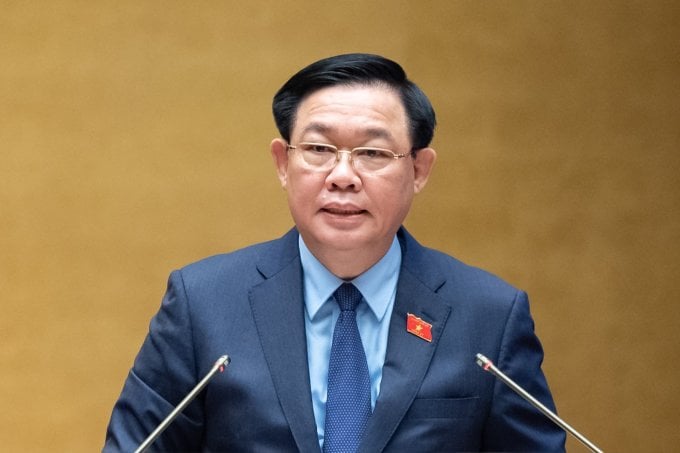
The National Assembly Chairman chaired the question-and-answer session on the morning of June 8. Photo: National Assembly Media
Delegate Nguyen Minh Son (Deputy Chairman of the Economic Committee) said that the increase in mining capacity at sand mines when implementing projects could cause subsidence, negatively affecting the environment. The delegate asked Minister Nguyen Van Thang to clarify solutions to this situation.
Mr. Thang said that for the sand demand in the construction of the North-South Expressway in the East, the Can Tho - Ca Mau section needs 18 million m3 of sand, the implementation time is 3 years. According to the current planning, there are about 130 million m3, concentrated in 3 provinces An Giang, Dong Thap and Vinh Long. Meanwhile, the expressway has a total of 8 component projects, needing about 50 million m3 of sand. Thus, according to the planning, the source of raw materials is still guaranteed.
Regarding the Can Tho - Ca Mau project, the Ministry of Transport and Natural Resources and Environment worked with three provinces. Accordingly, the Prime Minister assigned An Giang to provide 7 million, Dong Thap 7 million, and Vinh Long 5 million m3. The provinces are completing procedures to ensure adequate supply of materials for this project. Regarding environmental issues, the Ministry of Natural Resources and Environment has coordinated with localities to make careful and objective assessments.
Creating trust for BOT businesses
Delegate Trinh Xuan An (full-time member of the National Defense and Security Committee) said that some projects mentioned by the Minister do not have deadlines or specific confirmations, especially for BOT projects. The delegate suggested that for many projects, the Minister should have specific commitments to reassure people, businesses and investors.
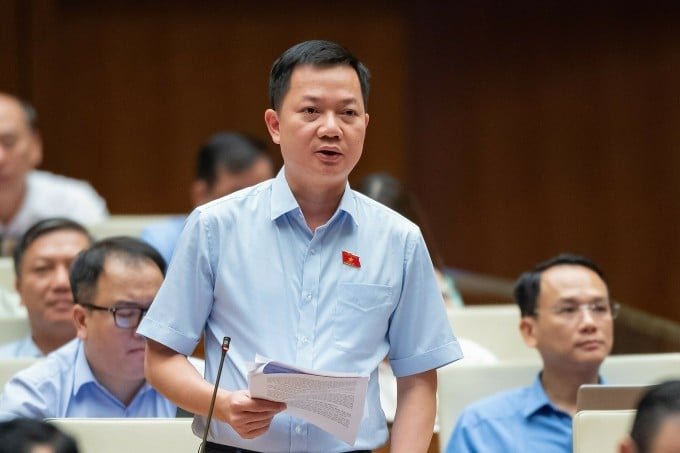
Delegate Trinh Xuan An (full-time member of the National Defense and Security Committee). Photo: National Assembly Media
According to Mr. Nguyen Van Thang, the Ministry of Transport is also very concerned about the problems in these BOT projects. The Ministry has summarized and evaluated, and in the coming time, it will continue to advise the Government to thoroughly remove barriers and problems in the BOT sector from institutions, policies to specific issues. "We must create trust and remove problems so that BOT enterprises can confidently invest their resources," said Mr. Thang.
He said the Ministry has directed the review and assessment of not only the 8 BOT projects facing difficulties but also all BOT projects nationwide, including central and local projects, to have a complete picture and propose solutions. After synthesizing local opinions and identifying problems, the Ministry will resubmit the handling plan for the 8 BOT projects to the National Assembly Standing Committee and the National Assembly.
Debate with Minister Thang at the end of the afternoon session on June 8, delegate Nguyen Lan Hieu (Director of Hanoi Medical University Hospital) said that logistics costs are very high, averaging 16.8-17% of the value of goods, and for some items, businesses even have to pay up to 20-25%. To reduce this burden, it is necessary to solve each step, even small problems, but if we pay attention, we can find better ways to reduce costs and improve efficiency.
The delegate gave an example of Tan Son Nhat airport, after repairs the number of takeoffs and landings was less than before the repairs. "Spending thousands of billions of dong to upgrade the airport runway is a waste. The Minister needs to pay attention to reducing logistics costs in Vietnam," said Mr. Lan Hieu.
Responding, Minister Nguyen Van Thang said that according to international practice, logistics costs are always compared to GDP. In 2022, it was at 16.8% of GDP - high compared to the world average. Meanwhile, this rate has approached the minimum target set by the Government in the Vietnam Logistics Development Strategy to 2025 of 16-20%.
Vietnam is ranked 43rd out of 139 countries participating in the ranking and in ASEAN, Vietnam is ranked fourth. "This is the initial result to continue striving and in reality there is still a lot of room to reduce logistics costs," said Mr. Thang, adding that the Ministry will continue to make efforts and coordinate with ministries and branches to focus on developing synchronous transport infrastructure such as dry ports and logistics centers.
Mr. Thang also informed that the aviation planning has completed procedures and has been submitted to the Prime Minister, and this planning may be issued in the coming days. When the planning is available, the Ministry of Transport will invest in connecting waterways with seaports, taking maritime planning and seaports as the center to connect with waterways, railways, and connect Cai Mep - Thi Vai port to the Southwest routes, minimizing logistics costs.
At the end of the question-and-answer session of Transport Minister Nguyen Van Thang, National Assembly Chairman Vuong Dinh Hue said that 112 delegates registered to question, 20 delegates asked questions, and 17 delegates debated. There were 76 people who registered to question and 2 people debated, but because time ran out, he suggested sending questions for the Minister to answer in writing.
The National Assembly Chairman assessed the question-and-answer session as lively, responsible, frank and highly constructive. National Assembly deputies closely followed the content of the question-and-answer session, actively pursued and debated to clarify the issues. The Minister of Transport has not been in office for long but has a firm grasp of the issues, fully explained the shortcomings and limitations; and proposed both short-term and long-term solutions to better perform the responsibilities of the Ministry and the sector.
"In recent times, the transport sector has promoted a sense of responsibility, made efforts to overcome difficulties, and completed a large and complicated volume of work," the National Assembly Chairman commented.
See main eventsSource link


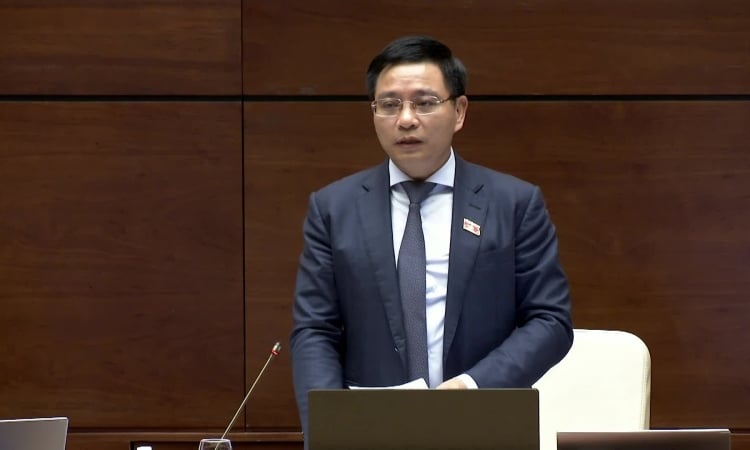
![[Photo] Readers line up to visit the photo exhibition and receive a special publication commemorating the 135th birthday of President Ho Chi Minh at Nhan Dan Newspaper](https://vphoto.vietnam.vn/thumb/1200x675/vietnam/resource/IMAGE/2025/5/17/85b3197fc6bd43e6a9ee4db15101005b)



![[Photo] More than 17,000 candidates participate in the 2025 SPT Competency Assessment Test of Hanoi National University of Education](https://vphoto.vietnam.vn/thumb/1200x675/vietnam/resource/IMAGE/2025/5/17/e538d9a1636c407cbb211b314e6303fd)
![[Photo] Prime Minister Pham Minh Chinh chairs meeting on science and technology development](https://vphoto.vietnam.vn/thumb/1200x675/vietnam/resource/IMAGE/2025/5/17/ae80dd74c384439789b12013c738a045)




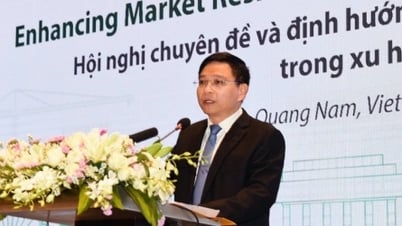








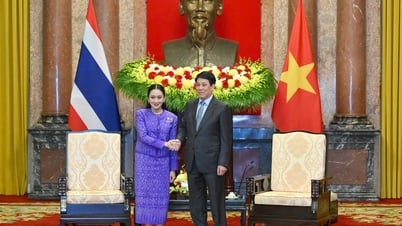


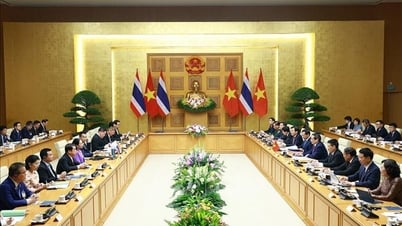



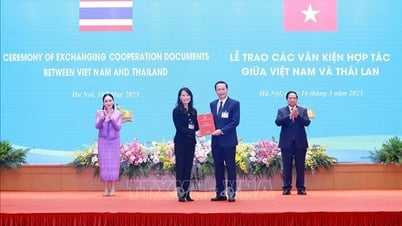










![[Photo] Nearly 3,000 students moved by stories about soldiers](https://vphoto.vietnam.vn/thumb/1200x675/vietnam/resource/IMAGE/2025/5/17/21da57c8241e42438b423eaa37215e0e)














































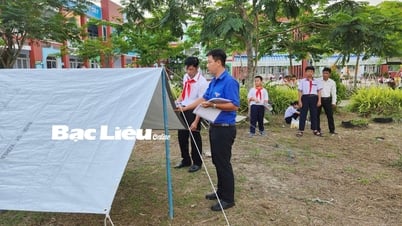


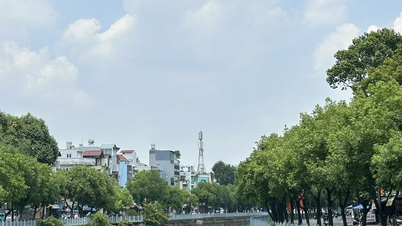


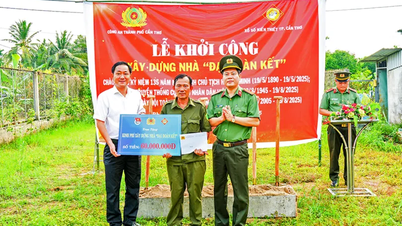

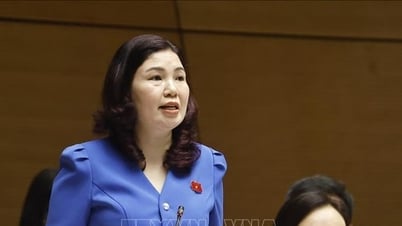











Comment (0)